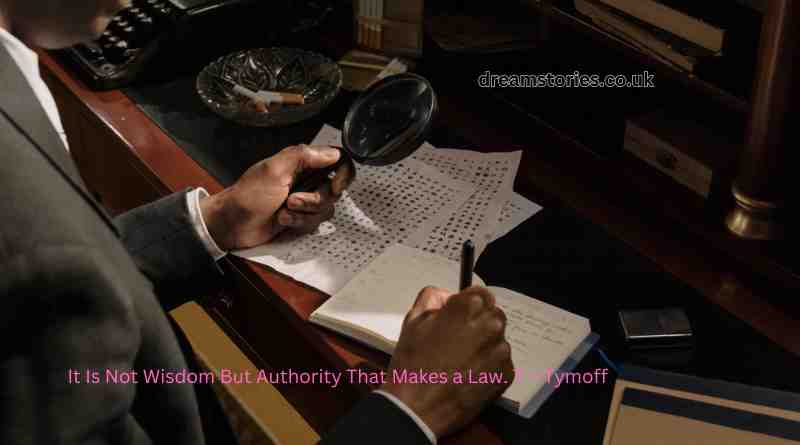In an era where the dynamics of power and governance are constantly evolving, the phrase “It is not wisdom but authority that makes a law. T – Tymoff” resonates more profoundly than ever. This exploration delves into the intricate relationship between authority, wisdom, and the legislation process, unraveling the layers of meaning behind this compelling assertion. As we journey through historical contexts, contemporary implications, and future prospects, this article sheds light on the essence of law-making and governance in 2024.
The Genesis of Authority and Wisdom in Law
Historically, the genesis of law intertwines with the concepts of authority and wisdom. Authority, derived from societal structures and hierarchies, has always played a pivotal role in the formulation and enforcement of laws. Wisdom, on the other hand, symbolizes the knowledge, insight, and ethical considerations that ideally should inform the legislative process. However, the maxim “It is not wisdom but authority that makes a law” suggests a nuanced reality where authority often overshadows wisdom in the creation of laws.
Authority in Historical Context
The role of authority in law-making can be traced back to ancient civilizations, where rulers and governing bodies wielded the power to decree laws. This authority was often derived from divine right or conquest, rather than the wisdom or moral righteousness of the leaders. Throughout history, this pattern has persisted, with authority being the cornerstone upon which laws are established and maintained.
Wisdom’s Role in Legislation
Wisdom, although universally revered, has played a more variable role in the legislative process. Philosophers and thinkers, from Plato to Montesquieu, have argued for the importance of wisdom in governance. They envisioned a system where laws are crafted and applied with foresight, compassion, and understanding, reflecting the best interests of society. Yet, the ideal of wisdom-guided legislation often clashes with the realities of political power and authority.
The Modern Landscape: Authority versus Wisdom
In the contemporary world, the interplay between authority and wisdom in law-making has become increasingly complex. The advent of democratic institutions and the spread of information technology have transformed the ways in which authority is acquired and exercised. Yet, the assertion by Tymoff underscores a persistent challenge: the predominance of authority over wisdom in the legal framework.
Authority in the Digital Age
The digital age has reshaped the landscape of authority, with new forms of power emerging from technological innovation and information dissemination. Social media platforms, artificial intelligence, and digital surveillance tools have granted unprecedented authority to both state and non-state actors. This transformation raises critical questions about the role of authority in the law-making process and its implications for democracy and governance.
The Quest for Wisdom in Governance
Despite the overwhelming influence of authority, the quest for wisdom in governance remains vital. The challenges of the 21st century — including climate change, global pandemics, and social inequality — demand a reevaluation of how laws are made and applied. Wisdom, with its emphasis on long-term sustainability, ethical considerations, and the common good, offers a guiding principle for addressing these challenges. However, incorporating wisdom into the legislative process requires significant shifts in societal values and governance structures.
Future Directions: Reconciling Authority and Wisdom
Looking ahead to 2024 and beyond, the reconciliation of authority and wisdom in law-making emerges as a critical task. This section explores potential pathways for integrating wisdom into the framework of authority, envisioning a legal system that upholds justice, equity, and foresight.
Empowering Wise Leadership
One pathway to reconciling authority and wisdom lies in the cultivation and empowerment of wise leadership. This entails not only selecting leaders based on their knowledge and ethical judgment but also fostering a political culture that values wisdom. Educational systems, public discourse, and leadership development programs play key roles in shaping a governance ethos that prioritizes wise decision-making.
Enhancing Democratic Participation
Enhancing democratic participation offers another avenue for infusing wisdom into the legal system. By expanding the role of citizens in the legislative process — through mechanisms such as deliberative democracy, participatory budgeting, and direct referenda — the wisdom of the collective can inform and temper the exercise of authority. This approach not only democratizes law-making but also harnesses the diverse insights and experiences of the population.
Leveraging Technology for Wise Governance
Finally, technology presents both challenges and opportunities for the integration of wisdom in governance. While digital tools can amplify the power of authority, they also offer innovative ways to enhance transparency, accountability, and public engagement. Blockchain technology, for instance, can secure voting systems and legislative records, while data analytics can provide insights into the long-term implications of legal decisions. By leveraging technology wisely, the legal system can become more responsive, equitable, and forward-looking.
Conclusion: The Path Forward
The maxim “It is not wisdom but authority that makes a law. T – Tymoff” serves as a poignant reminder of the complexities inherent in the law-making process. As we move forward into 2024, the challenge lies in balancing the scales between authority and wisdom, ensuring that our legal systems reflect not just the power to govern, but the foresight and ethical commitment to do so justly. By embracing wise leadership, enhancing democratic participation, and leveraging technology for good governance, we can aspire to a future where laws embody the best of both authority and wisdom.
Read also: check

